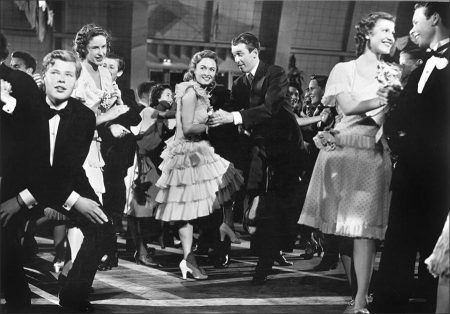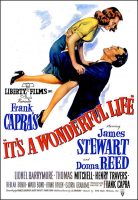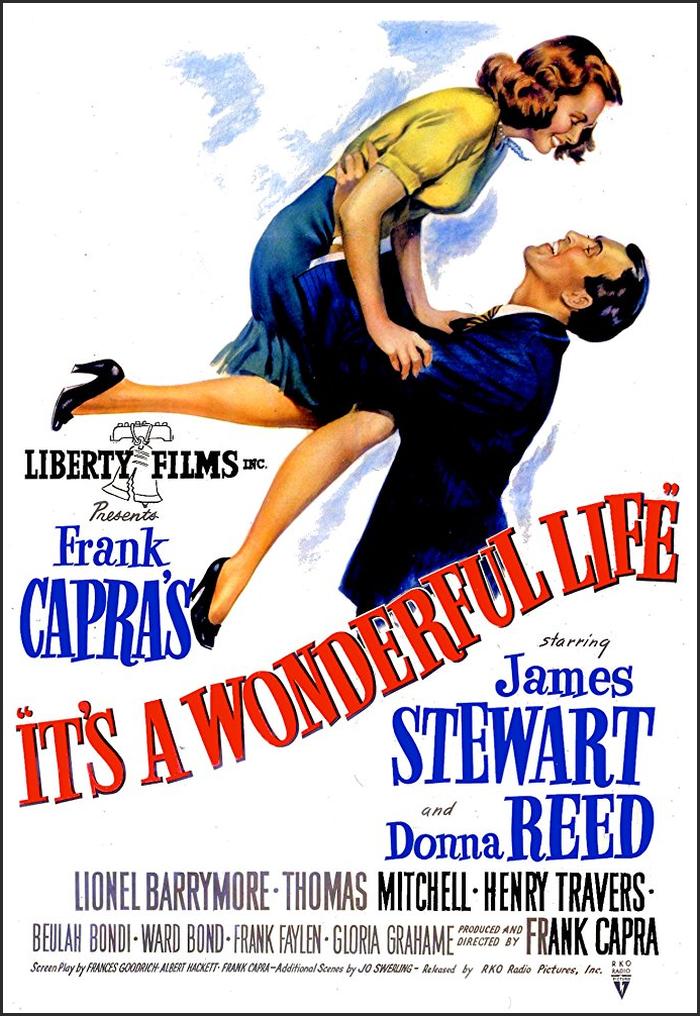It’s A Wonderful Life movie storyline. George Bailey has spent his entire life giving of himself to the people of Bedford Falls. He has always longed to travel but never had the opportunity in order to prevent rich skinflint Mr. Potter from taking over the entire town. All that prevents him from doing so is George’s modest building and loan company, which was founded by his generous father. But on Christmas Eve, George’s Uncle Billy loses the business’s $8,000 while intending to deposit it in the bank. Potter finds the misplaced money.
When the bank examiner discovers the shortage later that night, George realizes that he will be held responsible and sent to jail and the company will collapse, finally allowing Potter to take over the town. Thinking of his wife, their young children, and others he loves will be better off with him dead, he contemplates suicide. But the prayers of his loved ones result in a gentle angel named Clarence coming to earth to help George, with the promise of earning his wings. He shows George what things would have been like if he had never been born.
It’s A Wonderful Life (1946), originally made for Liberty Films, is one of the most popular and heartwarming films ever made by director Frank Capra. Frank Capra regarded this film as his own personal favorite – it was also James Stewart’s favorite of all his feature films. It was actually a box-office flop at the time of its release, and only became the Christmas movie classic in the 1970s due to repeated television showings at Christmas-time when its copyright protection slipped and it fell into the public domain in 1974 and TV stations could air it for free. [Republic Pictures restored its copyright claim to the film in 1993, with exclusive video rights to it. Currently, it can be shown only on the NBC-TV network, and its distribution rights belong to Paramount Pictures.]
The film’s screenplay (credited as being written by Frances Goodrich, Albert Hackett, and Capra himself, with additional scenes by Jo Swerling) was based on “The Greatest Gift,” an original short story first written on a Christmas card by Philip Van Doren Stern. Uncredited for their work on the script were Dorothy Parker, Dalton Trumbo, and Clifford Odets. It is actually a dark, bittersweet post-war tale of a savings-and-loan manager who struggles against a greedy banker and his own self-doubting nature in a small town.
Earnest do-gooder George Bailey (James Stewart) recognizes his life as wonderful and truly rich, even in its humdrum and bleak nature, only after suffering many hardships, mishaps and fateful trials (including compromised dreams of youth to leave the town and seek fame and fortune, other sacrifices, dismay, losses and the threat of financial ruin, and suicide). He is given encouragement by a whimsical, endearing, trainee-angel named Clarence (Henry Travers).
The story turns Dickensian (similar to A Christmas Carol, although told from Bob Cratchit’s point-of-view rather than from Scrooge’s) when the hysterical, despairing, and melancholy family man is shown what the small town (Bedford Falls, now renamed Pottersville after the town’s evil tycoon) would be like without him. It’s a frightening, nightmarish, noirish view of the world (at Christmas-time) that brings him back from self-destruction. He returns to the idyllic, small-town world that he left, with renewed faith and confidence in life itself. Hence, the film’s title: It’s a Wonderful Life.
It’s A Wonderful Life (1946)
Directed by: Frank Capra
Starring: James Stewart, Donna Reed, Lionel Barrymore, Thomas Mitchell, Henry Travers, Beulah Bondi, Frank Faylen, Ward Bond, Gloria Grahame, Frank Albertson, Todd Karns, Mary Treen
Screenplay by: Frances Goodrich, Albert Hackett
Cinematography by: Joseph F. Biroc, Joseph Walker, Victor Milner
Film Editing by: William Hornbeck
Costume Design by: Edward Stevenson
Set Decoration by: Emile Kuri
Art Direction by: Jack Okey, William Cameron Menzies
Music by: Dimitri Tiomkin
Distributed by: RKO Radio Pictures
Release Date: December 20, 1946
Views: 160





